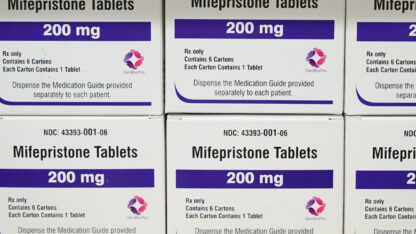5 Georgia health storylines to watch in 2023

A small group, including Stephanie Batchelor, left, sits on the steps of the Georgia state Capitol protesting the overturning of Roe v. Wade on June 26, 2022. (AP Photo/Ben Gray, File)
Health issues made big news in Georgia in 2022. The trend is likely to continue in 2023, including at the Gold Dome during the upcoming legislative session. WABE will be following along to see how it all plays out and how it could impact communities across Atlanta and beyond. Here are just a few of the topics the newsroom will be watching for.
1. Access to mental health care in Georgia
The state struggles with persistent gaps in access to mental health and substance abuse services and a shortage of providers. In 2022, the General Assembly passed the Mental Health Parity Act, which requires health insurers in Georgia to cover mental and behavioral health conditions on par with physical health conditions. It also provides incentives to grow Georgia’s provider workforce and requires the state to track compliance with the law. In the upcoming legislative session starting Jan. 9, mental health advocates will be pushing lawmakers to build on the provisions in the law, also known as House Bill 1013, and provide more funding for community-based addiction and mental health prevention, treatment and recovery services.
2. Abortion rights
Last year saw months of legal battles over Georgia’s law banning abortion after around six weeks, when cardiac activity is detected in the womb and before many women even know they are pregnant. The battles are far from over. House Bill 481 took effect a month after the U.S. Supreme Court decision in June that overturned Roe v. Wade abortion guarantees. A coalition of abortion-rights advocates and medical providers sued to block the law on constitutional grounds. After a two-day trial in Fulton County Superior Court, the case is now heading for the Georgia Supreme Court. Judges there will decide whether the abortion restrictions can remain in effect in Georgia. It’s unclear when the court will take up the case.
3. Georgia’s healthcare network
In November, Wellstar Health System closed Atlanta’s century-old Atlanta Medical Center in the Old Fourth Ward, citing mounting financial losses. The decision to shutter the Level 1 trauma center drew outcry over the loss of access to medical care in a state with dramatic health disparities. It also sparked concern about the closure’s impact on nearby hospitals, especially Grady Memorial Hospital, the city’s only other Level 1 trauma center. Grady officials tell WABE the hospital is seeing approximately 30% more trauma patients since AMC closed. Last spring, Wellstar also closed AMC South, the only full-service Fulton County emergency department south of I-20. Health advocates say the state needs to do more to support its struggling hospital system. They want Georgia to fully expand Medicaid, which Gov. Brian Kemp opposes, to cover more Georgians and boost reimbursements to hospitals.
4. Addiction and recovery
The drug overdose crisis has escalated dramatically during the pandemic. The United States Centers for Disease Control and Prevention reported 107,622 drug overdose deaths in 2021 — a record number — most linked to opioids. Such deaths have also risen dramatically in Georgia. Among the Georgia Council for Recovery’s priorities for 2023 is a push for more state and federal funding for community-based treatment and recovery programs led directly by people in recovery, and for more harm-prevention resources and education to promote awareness of the overdose-reversal medication naloxone. The coalition is also seeking to give people affected by addiction and overdose a greater say in how the state allocates hundreds of millions of dollars from the recent $26 billion multistate opioid settlement.
5. Public health and COVID-19
Three years into the pandemic, public health officials are again recommending masking indoors in areas with high COVID-19 community levels, in crowded areas such as public transportation and for people at higher risk for severe infection. While the national coronavirus surge remains below last winter’s levels, Georgia has seen a rise in reported cases and COVID-19 hospitalizations since Thanksgiving, just as influenza and RSV activity also spiked. CDC Director Dr. Rochelle Walensky is lobbying federal lawmakers to give the agency more authority, including the ability to compel the sharing of data between the federal, state and local levels. She says broader authority could help the Atlanta-based agency better respond during public health emergencies. The CDC has come under fire for its handling of the pandemic, the Mpox outbreak and other health crises.
This is part of WABE’s Storylines To Watch In 2023 series. Click here to see which storylines WABE reporters are watching on their beats — including arts and culture, criminal justice, education, the environment, housing, immigration and politics — so you’re in-the-know on what the year may bring.







